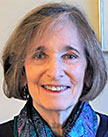- About
-
-

- About
-
ACGIH is a 501(c)(3) charitable scientific organization that advances occupational and environmental health.
-
-
- Subscriptions
-
- Science
-
-

- Science
-
This section has been established to help educate industry, government, and the public on what TLVs and BEIs are, and how TLVs and BEIs may best be used.
-
-
- Career Development
-
-

- Career Development
-
ACGIH is committed to providing its members and other occupational and environmental health professionals with the training and education they need to excel in their profession.
-
-
- Publications
-
-

- Publications
-
ACGIH has publications in many different areas that fit your needs in your field.
-
- Publications Store
- ACGIH Signature Publications
ACGIH Digital Library
If you need to purchase the Digital Library, click here.
If you have purchased and need to access the Digital Library, click here.
-
-

Lecturer: Marianne Levitsky, MES, CIH, ROH, FAIHA
Marianne Levitsky was founding President of Workplace Health Without Borders, a non-profit organization that engages volunteers in promoting occupational health for workers everywhere. A senior associate with ECOH, an Ontario consulting firm, she was previously Director, Prevention Best Practices in the Ontario Workplace Safety and Insurance Board, an occupational hygienist with the Ontario Ministry of Labour, and a co-founder of the Toronto Workers’ Health and Safety Legal Clinic. She is adjunct faculty at the University of Toronto and was a member of the Toronto Board of Health. Marianne has received the Hugh Nelson award for excellence in occupational hygiene from the Occupational Hygiene Association of Ontario and the Yant Award from AIHA. She has served as chair of the AIHA International Affairs Committee and is an AIHA Fellow and Distinguished Lecturer.
Lecture Title: Industrial Hygiene: Crossing the borders
Abstract:
Involvement in a “without borders” organization can make one sensitive to the boundaries that hem us in or keep us out. In the industrial hygiene profession, it can seem that these boundaries too often keep us out of the larger community concerned with global development and health. The stated priorities of global institutions seldom emphasize workplace health, and funding for our research and initiatives is hard to come by. The COVID-19 crisis has highlighted how ill-prepared societies are to protect worker health and safety. While the pandemic has elevated occupational health on the priority list, there is a danger that it will slip again when this crisis is past.
As one of the smaller professions within the Environment, Health and Safety sphere, industrial hygienists can find it difficult to be heard. We often don’t speak the language of the broader global health and development community – for example, we rarely couch our priorities in terms of the UN Sustainable Development Goals or in public health concepts which often frame global issues. This lecture will explore some of these boundaries and offer thoughts on what is needed to cross these borders.





